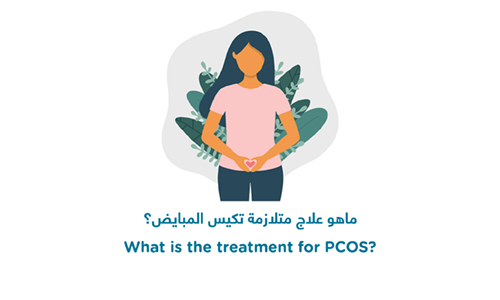


Polycystic Ovarian Syndrome (PCOS), is a common health problem caused by an imbalance of reproductive hormones. The hormonal imbalance creates problems in the ovaries. The ovaries make the egg that is released each month as part of a healthy menstrual cycle. With PCOS, the egg may not develop as it should or it may not be released during ovulation as it should be.
Having PCOS does not mean you can’t get pregnant. PCOS is one of the most common, but treatable, causes of infertility in women.
Your doctor can talk with you about ways to help you ovulate and to raise your chance of getting pregnant. You can also use our Ovulation Calculator to see which days in your menstrual cycle you are most likely to be fertile.
The main goal when treating PCOS is to reduce the risk factors associated and treat the possible consequences on your body and health. There are different options to treat PCOS and they depend on several factors, including your symptoms, your other health problems, and whether you want to get pregnant.
Lifestyle Changes: Often, the first action that doctors recommend for women with PCOS is to make lifestyle changes, in order to reduce the effect of insulin resistance in your body, like losing weight through a healthier diet and more physical activity. Losing weight through healthy eating and regular physical activity can help make your menstrual cycle more regular and improve your fertility. These changes can minimize many PCOS symptoms and related conditions.
Medicine: After ruling out other causes of infertility in you and your partner, your doctor might prescribe medicine to help you ovulate, such as hormone therapy and Medication for Ovulation . Clomid (clomiphene) is the most common PCOS treatment; it helps with ovulation and follicle development. PCOS patients may also be given follicle-stimulating hormones (FSH), progesterone, or treatment to specifically affect estrogen production. Metformin, it is another tablet that you may be prescribed, this can help to lower your insulin levels and stimulate fertility.
IVF procedures: It may be an option if medicine does not work. The large majority of women with PCOS that have not gotten pregnant with other treatments will be able to have success with IVF if they are under 40 years of age and have their IVF performed at a high quality clinic.
IVF has higher pregnancy rates and better control over your risk of having twins and triplets (by allowing your doctor to transfer a single fertilized egg into your uterus).
In order to assess increased risk of hyperstimulation as a result of the IVF process, the doctor always monitors the ovarian reserve of the patient by assessing the number of follicles the patient has before starting the IVF process. This is very important as this will dictate the tailored and specific dose regimen for the patient, which is helpful to prevent and to control the risk of developing hyperstimulation during IVF.
Surgery: It is also an option, a minor surgical procedure called laparoscopic ovarian drilling (LOD) may be a treatment option for fertility problems associated with PCOS that do not respond to medicine. Ovarian drilling is a surgery in which the doctor makes a few holes in the surface of your ovary using lasers or a fine needle heated, to destroy the tissue that’s producing androgens (male hormones). LOD has been found to lower levels of testosterone and luteinising hormone (LH), and raise levels of follicle-stimulating hormone (FSH).